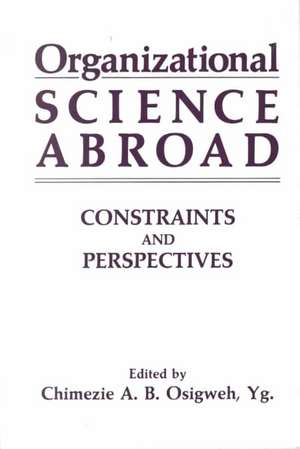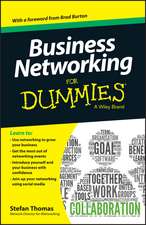Organizational Science Abroad: Constraints and Perspectives
Editat de C.A.B., Yg. Osigwehen Limba Engleză Hardback – 30 ian 1989
| Toate formatele și edițiile | Preț | Express |
|---|---|---|
| Paperback (1) | 947.85 lei 6-8 săpt. | |
| Springer Us – 21 iun 2013 | 947.85 lei 6-8 săpt. | |
| Hardback (1) | 953.97 lei 6-8 săpt. | |
| Springer Us – 30 ian 1989 | 953.97 lei 6-8 săpt. |
Preț: 953.97 lei
Preț vechi: 1163.38 lei
-18% Nou
Puncte Express: 1431
Preț estimativ în valută:
182.57€ • 188.60$ • 151.94£
182.57€ • 188.60$ • 151.94£
Carte tipărită la comandă
Livrare economică 25 martie-08 aprilie
Preluare comenzi: 021 569.72.76
Specificații
ISBN-13: 9780306429699
ISBN-10: 0306429691
Pagini: 340
Ilustrații: XXIV, 340 p.
Dimensiuni: 155 x 235 x 21 mm
Greutate: 0.69 kg
Ediția:1989
Editura: Springer Us
Colecția Springer
Locul publicării:New York, NY, United States
ISBN-10: 0306429691
Pagini: 340
Ilustrații: XXIV, 340 p.
Dimensiuni: 155 x 235 x 21 mm
Greutate: 0.69 kg
Ediția:1989
Editura: Springer Us
Colecția Springer
Locul publicării:New York, NY, United States
Public țintă
ResearchDescriere
Organizing consists of making other people work. We do this by manip ulating symbols: words, exhortations, memos, charts, signs of status. We expect these symbols to have the desired effects on the people con cerned. The success of our organizing activities depends on whether the others do attach to our symbols the meanings we expect them to. Whether or not they do so is a function of what I have sometimes called "the programs in their minds" -their learned ways of thinking, feeling, and reacting-in short, a function of their culture. The assumption that organizations could be culture-free is naive and myopic; it is based on a misunderstanding of the very act of organizing. Certainly, few people who have ever worked abroad will make this assumption. The dependence of organizations on their people's mental pro grams does not mean, of course, that we do not find many similarities across organizations. Some characteristics of human mental program ming are universal; others are shared by most people in a continent, a country, a region, an industry, a scientific discipline, or even a gender.
Cuprins
I. Introduction.- 1. The Myth of Universality in Transnational Organizational Science.- 2. From the Atlantic to the Pacific Century: Cross-Cultural Management Reviewed.- II. Insights and Perspectives from Europe.- 3. Applying American Organizational Sciences in Europe and the United Kingdom: The Problems.- 4. The Failure of Management Techniques in Central Planning Economies.- 5. Union-Management Participation in Corporate Decision-Making: A Comparative Analysis of Codetermination in West Germany and the United States.- 6. Convergence or Divergence of Strategic Decision Processes among 10 Nations.- III. Insights and Perspectives from Asia.- 7. The Diffusion of American Organizational Theory in Postwar Japan.- 8. Rational Man Theory in American and Japanese Performance Control.- 9. Chinese Enterprise Management.- 10. A Comparison of Enterprise Management in Japan and the People’s Republic of China.- IV. Other Specific Insights and Perspectives.- 11. Contradictions between Brazilian and U.S. Organizations: Implications for Organizational Theory.- 12. The Influence of Societal Culture on Corporate Culture, Business Strategy, and Performance in the International Airline Industry.- V. Conclusion.- 13. Organizational Effectiveness and Its Attainment: A Cultural Perspective.- 14. Organizational Science in a Global Environment: Future Directions.- About the Authors.












